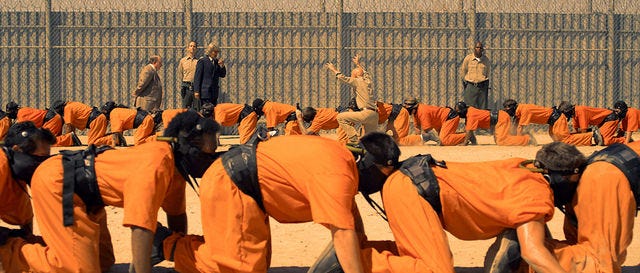Someone always asks: So what do we do about it?
Given that I’ve just written a two-part essay comparing the governing class in America and much of the world to a rapist-led cult that ended with mass murder, I may not be the person to turn to for practical tips on reform. I don’t have a recipe to fix things; it’s not at all my impression that we have a set of simple steps we can take to bring the world back around to sanity, like we’re headed over there but we just need to turn the wheel so we’re headed back that way. We have cascading systems failure — in culture, in politics, in economic systems, in institutions, in social connections, in families, in our sense of identity. Each piece of the world is falling apart, so the world is falling apart. Quick, fix that!
However.
Everything cycles. There are no straight lines in history, with the exception of those spoken by Margaret Dumont. Tomorrow will be different; next year will be more different. “In the 1780s and 1790s,” writes the historian Jack Larkin, “nearly one-third of rural New England’s brides were already with child.” By 1840, “the rate had dropped from nearly one pregnant bride in three to one in five or six; in some places the rate of prenuptial pregnancy dropped to five percent.” Things change, sometimes because of a movement to cause change and sometimes because things just kind of change, and no one is exactly sure how or why. Societies pursue a new course because of distributed decision-making, because millions of individual choices gradually bake into a single cake. The one thing I say with confidence is that most people currently see the sickness in politics and culture, which is the start of a course correction. (If you’re paying close attention, I think I’ve just described a cake making a course correction. But anyway.)
We’ve built political systems that are astoundingly disconnected; they go where they go, and you can’t turn them, or even try to communicate with them. I just spent weeks trying to get basic information about the operation of the criminal justice system in Los Angeles County, where I live — a problem I started writing about here. Just as I was getting really frustrated that I couldn’t get anyone in county government to tell me anything about anything, I saw an interview with Sheriff Alex Villanueva, who says that he’s never met our district attorney, and has only managed to speak to him on the phone once. Then a staff member in the office of our county supervisor finally responded to my repeated questions about local criminal justice statistics with a quick message letting me know that, as Supervisor Barger’s criminal justice staff assistant, she doesn’t have local criminal justice statistics. So, no, you’re probably not going to communicate with your government; it doesn’t even communicate with itself. The sheriff has never met the DA. That’s the world we’re living in.
I live in a tiny suburban city, a little over three square miles. As I’ve written before, the city is a relentless shambles, constantly fumbling its simplest tasks while holding city council meetings to offer bold pronouncements on the city’s direct role in managing the climate of the planet. We went the better part of the last fiscal year without a budget, because the fifth finance director in two years screwed up the budget proposal so badly that the council couldn’t vote on the worthless thing.
Cities are supposed to regularly adopt an updated general plan that makes educated guesses about business and residential growth, so they can prepare for change around questions like do we have enough fire stations for the population we expect to have in five years? Our current general plan was adopted in 1998; the city is now in its sixth year of a fumbling effort to write a new plan, with no sign that it’s moving toward success. Meanwhile, our small-town city council is focused on getting electric patrol cars for the police department — to control the climate of the planet — and banning the sale of tobacco products, to take the fight to Big Tobacco. (Three square miles.)
I can’t get my city government to fix a bunch of basic and obvious problems, in a city where I pass members of my city council in the supermarket. I send out email messages to them, but nothing comes back from them in response. They go where they feel like going, endlessly pursuing lawn sign politics in a city government that struggles to complete budgets and basic planning documents; currently they’re signaling that their next interest is in developing a local mandate for residential greywater systems, and they won’t be talked out of it in favor of completing their endlessly incomplete basic tasks.
Now: Put your hands on the levers to stop the madness of the United States of America sending tens of billions of dollars to Ukraine. Right?
But if you can’t fix problems in government, you can protect yourself from them, at least to some degree. Though this argument still isn’t working in my own family, I think it’s long past time to get out of the Blue Zones, which are hurtling toward real ruin that will be really hard to fix. And the discussion about parallel societies and the Benedict Option, hilariously twisted by the usual slogan-chanters, is an important one.
But the more important thing is the increasingly naked stupidity of the Jacinda Ardern class, the Nina Jankowicz / Justin Trudeau / Dan Andrews / Max Boot / David French / Eric Garcetti / etc. human centipede, which offers nothing of value to anyone anywhere at any time. These people are well into the next phase after being lost, the post-lost stage in which they just babble meaningless noise. There aren’t many people left who don’t know that. It’s not working. It will fail — it is failing — and we will turn. A century-long cultural project is imploding, but its collapse and replacement won’t be a clean process.
I’m mostly convinced that our single biggest problem is preference falsification, in which people think X but say Y because they don’t want HR or the neighbors to accuse them of crimethink. Faking it, we create the appearance of support for things that aren’t well-supported.
So:
Stop nodding when you want to shake your head.
Start there. Say, “I don’t agree with that.”
Protect yourself and your family, maintain real human connections, spend time outdoors, keep speaking, assert your values and your preferences without regard to the appearance of the reception. Show up. Remember that nothing lasts forever, and stay in the fight. Have faith in the possibility that the cycle will break toward health, and act as if.
And if you have a more concrete plan than that, I’d be glad to hear it.






I will just add one thing - stop using Internet. Disconnect and get back to normal physical life. The people brains are overloaded and getting crazy from that.
Stop using Zoom meetings, don't call via on WhatsApp, use normal phone, stop using Facebook, write letter, stop using Twitter, read printed newspaper, disconnect from Instagram, print pictures and show photo albums to others, meet people in person and talk with them face to face.
This will help to stop the madness and return people back to normal real world. There is no other way around, you have to get back to normal physical life or this craziness will continue.
Completely agree Chris. Just keep standing up and do not be bullied. I stood up to the COVID bullying at work and was surprised at the support I got--after I continued to publicly, politely, and factually state my position. Be polite, but do not be bullied.
I tell people, "Please don’t try to save the world. That’s a temptation from the evil one that lures many of us in. Just be the best person you can be." I find the school board elections the most hopeful sign of turning things around. When Jehovahs Witnesses came to my door long ago and asked me, "Do you know the end of the world is coming soon?" I replied, "No, but I know I'm going to die." That's also the way to deal with the internet. Ask, "Is this something that is going to make me want to change my behavior?" If not, don't bother reading about it. I can't see how Kim Kardiashian's rear end means anything to my behavior, nor how Caitlyn Jenner's opinion means anything to my life. A male colleague once told me, "I decide on all the important issues, like our stance on nuclear disarmament. My wife decides on all the trivial stuff like where the kids go to school and what we have for dinner." He recognized the irony.
As to how to make it better, I have 2 doable but almost impossible suggestions. First, turn off the money spigot. If Congress and the Executive Branch have a trillion dollars a year to spend, the result will inevitably be a disaster that cannot be controlled. Second, end the charitable deduction. The churches will scream, the Red Cross will scream, but Bill Gates, George Soros, the Ford Foundation, Harvard et al will have to operate on a budget like the rest of us. I favor and donate to charities, but if they don't pay taxes on the income they take in every year, they will never care about what taxes do to the rest of us. If it doesn't hurt you, it's somebody else's problem.
Change people's minds by publicly standing for what YOU know is right, not what someone else tells you is right. To those I work with who think saving nature is their mission, I say, "The only thing Nature's ever done for me is try to kill me every day of my life. I don't litter and try to take care of my own household, not because Nature's ever done anything for me, but because I'm human, and I don't want to live in a pig sty."
Be a good person. Be kind. Don't be bullied. The world will change around you in ways you can never anticipate if you only stand for what's right for you and the people you encounter in your daily life. The rest is hubris.